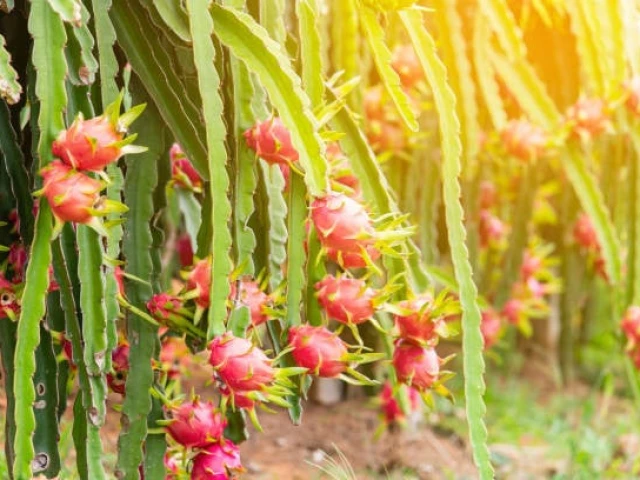Pakistan, China partnership transforms saline coastal land into dragon fruit fields
Tiantian Farm’s harvest marks a breakthrough in land rehabilitation, crop cultivation near Arabian Sea

A joint Pakistan-China agricultural venture has cultivated dragon fruit on formerly barren coastal terrain near Karachi and is bringing the produce into Pakistani markets.
The undertaking began four years ago when Tiantian Farm, a Chinese enterprise, partnered with another Chinese firm and three local Pakistani collaborators. Their goal was to convert 48 hectares of saline and alkaline land, just three kilometres from the sea, into productive farmland using Chinese land rehabilitation techniques. What was once deemed unsuited for agriculture is now supporting high-grade dragon fruit cultivation.
Today, the farm is actively cultivating on 20 hectares, with a plan to increase the area by an additional five hectares every three to five months. During peak season, nearly 50 local workers are employed, contributing to rural livelihoods and strengthening community engagement.
The harvested fruit is supplied through local supermarkets and specialty outlets and transported across Pakistan via domestic airlines. In addition, the fruit is finding a niche in Pakistan’s beverage industry, especially in bubble tea shops.
Tiantian Farm has been operating dragon fruit initiatives in Pakistan since 2018 and maintains an eight-hectare cultivation base in Lahore. Beyond production, the firm has distributed saplings, facilitated propagation of seedlings, and provided training to both farmers and scientific researchers.
Students from the University of the Punjab’s Centre of Excellence in Molecular Biology visited the Karachi farm to observe cultivation methods firsthand.
The varieties being grown include hongxin (red flesh), bairou (white flesh), huanglong (yellow dragon), Jindu, and Dahong 3, all recognised commercial cultivars in China. The project’s leadership also markets samples of Pakistani grown dragon fruit internationally, targeting buyers in the Middle East, Africa, Europe, and Central Asia. Early feedback has been favorable.
The management sees additional potential in processed products such as juices and dried fruit snacks, which they believe could significantly boost export value and open new income streams for Pakistan’s agricultural sector.
This initiative demonstrates how modern agricultural techniques and cross-border cooperation can transform marginal land and introduce new high-value crops. It also underlines opportunities for Pakistan to diversify its horticultural output and integrate into regional and global processed fruit markets.
Read: Farmers push for dragon fruit cultivation
After successfully harvesting dragon fruits for the first time in Sindh, progressive farmers believe that exporting dragon fruit varieties could potentially transform the national economy if done on a large scale.
The Express Tribune interviewed progressive farmers and researchers regarding the cultivation of dragon fruits, exploring aspects such as varieties, scope, trends, pricing, and farming techniques.
“I have cultivated around 7,000 plants in one acre, with plans to increase to 18,000 plants next year on almost three acres of land. I am expanding this startup business while providing consultancy and services to other enthusiastic farmers. Common farmers and big landlords often hesitate, but I took this initiative to operate on a commercial level, making me one of the three pioneers in the country. I am the first commercial dragon fruit farmer in Sindh and the third in Pakistan.
However, I am the sole practitioner of high-density dragon farming in the country. I introduced this technique, which is already being adopted in India. I harvested dragon fruits in June 2023, marking my first harvest as a litmus test to assess size, taste, and quality. The plants are now multiplying gradually through natural pollination.
Currently, the retail price in Pakistan varies between Rs3,000/kg and bulk Rs2,000/kg. I conducted a test sale to a Karachi supermarket at the rate of Rs1,700/kg,” mentioned Captain Rizwan Rehman, the progressive grower and owner of Delicious Dragon Fruit Farm and Nursery Karachi.
He highlighted that three cycles of fruiting in a year start from June to November in Pakistan. Regarding yield, the third-year fruiting from one plant averages 7kg. A farmer can generate revenue of around Rs2 billion annually from one acre by growing 8,000 plants in high density.
Rizwan emphasised that there is currently no export in the country due to high demand in Pakistan, and it’s not readily available. While exports will take time to develop, he believes that they could significantly impact the national economy due to high demand and rates. He also pointed out that, unlike India, the Pakistani government provides no support or subsidies for this industry.
“I am advocating for awareness and promotion of dragon fruit farming in Pakistan. I have cultivated fruits at my farm and nursery in Gadap, Karachi, boasting 80 varieties, including dark star, Philippine purple, red rubi, siam red, royal red, morocco red, orange prinkis, desert king, aussie gold, Taiwan honey red, asunta five, red rose, Vietnam white, and others. Apart from some varieties from Punjab, the rest were sourced from China, Taiwan, Indonesia, Turkey, the Philippines, and other countries,” he explained.
Muhammad Rehan, a small progressive farmer from Tando Allahyar, shared that he cultivated this fruit with 11 varieties in 2019 on a small piece of land and harvested good fruit weighing 320 to 330 grams in October.
Read More: Farmers to start sowing ‘golden grain’
He plans to cultivate dragon fruit on a commercial level and is in contact with farmers from Hyderabad, Mirpur Khas, Sanghar, Matiari, and others due to the promising returns.
“The trend in fruit cultivation is shifting towards exotic fruits. Dragon fruit is providing significant income returns to growers. We grew this elite fruit crop at Latif Farm of the SAU in March 2022 and harvested fruits in October 2023. We have set up 50 poles, with each pole carrying four plants. Initially, we established a nursery of around 20-30 plants, and now we have a rich nursery of 1,000 plants,” said Prof Dr Noorun Nisa Memon, the Principal Investigator of Model Fruit Nursery at Sindh Agriculture University (SAU).
Agricultural researchers indicated that there are more than 250 dragon fruit varieties, each with its own taste resembling strawberry, kiwi, pineapple, and others. They mentioned that dragon fruit varieties typically take around 18 months to produce fruit after planting, but they can mature earlier in the coastal areas of Karachi and Thatta due to suitable weather conditions.
Growing dragon fruits has the potential to significantly boost horticulture exports in Pakistan. The scope for dragon fruit cultivation is vast, and it proves to be highly profitable due to global demand. Researchers foresee a bright future for dragon farming in the coastal belt of Karachi and Thatta, where the weather conditions are ideal, requiring temperatures between 10 to 40 degrees Celsius.
They pointed out that Vietnam, the largest exporter of dragon fruit, exports $1.1 billion annually. In contrast, a Chinese couple and a local farmer named Ameen established commercial dragon fruit farms in Lahore and Kasur four years ago. Another local farmer, Sohail Ahmed Khan, is expanding his farm commercially in Sargodha and is expected to be ranked fourth soon in the local farming industry.



















COMMENTS (2)
Comments are moderated and generally will be posted if they are on-topic and not abusive.
For more information, please see our Comments FAQ